#dale spender
Text
Feminism
Feminism has fought no wars.
It has killed no opponents.
It has set up no concentration camps, starved no enemies, practised no cruelties.
Its battles have been for education, the vote, for better working conditions,
for safety in the streets, for child care, for social welfare, for rape crisis centres, women's refuges, reforms in the law.
If someone says, "Oh, I'm not a feminist,"
I ask, "Why? What's your problem?"
– Dale Spender: Man Made Language
482 notes
·
View notes
Text
‘After the Equal Pay Act, I went through a shoe factory where they were making men's shoes and women's shoes. There were a lot of women pounding shoes - putting heels on actually. And there were a lot of men in another part putting heels on shoes. I said to the manager “I suppose you have equal pay?” And he said “Oh yes, we have equal pay.” So I asked him, "Do you mean to say that the women here running this machine and the men over there running the same machine, get the same pay?" He said "Oh no! Heavens no! Those men are putting heels on male shoes. The women are putting heels on women's shoes. It's not the same work."
‘There were six nails going into each shoe.’ Hazel Hunkins Hallinan declared ‘and they were using the same machines. But the women didn't get the same pay' (1977:1982).
She needed no reminder that men 'called the shots', that they defined the terms and could quickly change them to suit their own convenience - a common practice when women looked like making inroads into territory men had reserved for themselves. But even women could be forgiven for failing to anticipate that the Equal Pay Act could be implemented in this way. It took a peculiar twist in logic (and a commitment to underpaying women) to arrive at this arrangement.
-Dale Spender, There’s Always Been a Women’s Movement This Century
#dale spender#hazel hunkins hallinan#equal pay act#british history#female oppression#male entitlement
404 notes
·
View notes
Text
“The talkativeness of women has been gauged in comparison not with men but with silence. Women have not been judged on the grounds of whether they talk more than men, but of whether they talk more than silent women.”
Dale Spender
2 notes
·
View notes
Text
Closing in on the end of my last final paper...
#I was so overworked this term that I couldn't manage to finish all my finals despite working nonstop#my Women and Gender prof was kind enough to give me an extension but that has meant continued exile in academia hell#while everyone else is already enjoying their summer#spent WEEKS kicking and screaming over starting this paper#the WORST part of this was trying to put together a subject and argument and find sources#eternal thanks to Dale Spender and Eileen O'Neill for giving me a bridge from discussing Aphra Behn#to discussing the lack of individuality for women in patriarchy#thankfully I'm deep into the writing section now so things are much more enjoyable#And I like how the paper's going so far!#but I will be so ready to see the back of this project...#the college saga continues
6 notes
·
View notes
Text
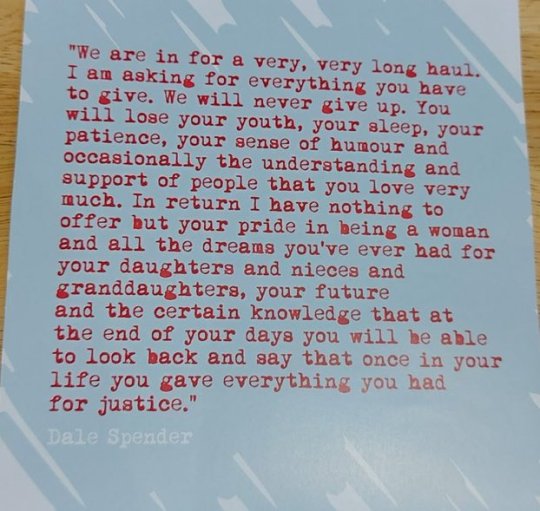
World-acclaimed feminist, beloved educator and widely published author who was nothing short of brilliant, Dr Dale Spender AM has passed away aged 80.
57 notes
·
View notes
Note
just found your account and so sorry about these anons. for distraction: you have the mic. now tell me everything about the x files.
Oh, anon, this is so sweet of you. Unfortunately I don't remotely have time to tell you everything about the X-Files...this is a show layered and impactful enough to have inspired an entire realm of scholarship, including several very good books.
If for some reason you haven't watched the X-Files, and are at all curious about how television got the way it did over the past 30 years, you just must (as well as Twin Peaks. Modern media simply could not be what it is without these two shows). There's a reason it's 30 years old and people are still completely obsessed with it.
But some specific things about the X-Files that I wish other people were more obsessed about:
What can Kurt Crawford's backstory possibly be?
What was Jeffrey Spender's relationship with Samantha like? What happened between Spender and Mulder between the original series finale and the revival?
What's the thesis being developed with regard to all the Vietnam vets who are characters on this show?
Poorboy! Poorboy! Why don't more people clock that Poorboy is the longest-surviving alien shapeshifter defector from the colonization project?!
Also Arthur Dales. He's so good and I love him so much.
Do we think the revival was signaling really hard that Jackson has a living older half-sister still out there? Because I think it was.
And this show's relationship with its autistic characters is... fascinating.
And possibly my single most controversial opinion about this show? The mythology makes sense.
Anyway, thank you for this soapbox. I hope you have a nice night.
Anyone else--I would deeply welcome any and all yelling about these or other X-Files-related questions.
34 notes
·
View notes
Text
The Feminist Library
-7000 Years of Patriarchy by Petra Ioana
-A Deafening Silence by Patrizia Romito
-Against Our Will by Susan Brownmiller
-Against Pornography by Diana E.H. Russell
-Against Sadomasochism by Robin Linden
-Ain’t I a Woman by Bell Hooks
-All Women Are Healers by Diane Stein
-Anti-Porn by Julia Long
-Anticlimax by Sheila Jeffreys
-Are Women Human by Catharine MacKinnon
-Backlash by Susan Faludi
-Bad Feminist by Roxane Gay
-Beauty and Misogyny by Sheila Jeffreys
-Beauty Sick by Renee Engeln
-Beauty Under the Knife by Holly Brubach
-Being and Being Bought by Kasja Ekis Ekman
-Beyond God the Father by Mary Daly
-Big Porn Inc by Melinda Tankard Reist and Abigail Bray
-Blood, Bread, and Roses by Judy Graham
-The Book of Women’s Mysteries by Z Budapest
-Borderlands by Gloria Anzaldua
-Burn it Down by Lilly Dancyger
-Butterfly Politics by Catharine MacKinnon
-Caliban and the Witch by Silvia Federici
-Choosing to Conform by Avelie Stuart
-The Church and the Second Sex by Mary Daly
-Cinderella Ate My Daughter by Peggy Orenstein
-Close to Home by Christine Delphy
-Compulsory Heterosexuality and Lesbian Existence by Adrienne Rich
-Conquest by Andrea Lee Smith
-Damned Whores and God’s Police by Anne Summers
-Daring to Be Bad by Alice Echols
-Dead Blondes and Bad Mothers by Sady Doyle
-Defending Battered Women on Trial by Elizabeth A. Sheehy
-Deliver Us from Love by Brogger
-Delusions of Gender by Cordelia Fine
-Detransition by Max Robinson
-The Disappearing L by Bonnie J. Morris
-Does God Hate Women by Ophelia Benson
-Doing Harm by Maya Dusenbery
-The End of Gender by Debra W. Soh
-The End of Patriarchy by Robert Jensen?
-Female Chauvinist Pigs by Ariel Levy
-Female Erasure by Ruth Barrett
-Female Sexual Slavery by Kathleen Barry
-Femicide by Jill Radford and Diane EH Russell
-Femininity by Susan Brownmiller
-Femininity and Domination by Sandra Lee Bartky
-Feminism Unmodified by Catharine MacKinnon
-Feminist Theory by Bell Hooks
-Firebrand Feminism by Breanne Fahs
-Flesh Wounds by Blum
-Flow by Elissa Stein and Susan Kim
-For Her Own Good by Barbara Ehrenreich
-For Lesbians Only by Sarah Lucia Hoagland
-Freedom Fallacy by Miranda Kiraly
-Gender Hurts by Sheila Jeffreys
-Getting Off by Robert Jensen?
-Global Woman by Barbara Ehrenreich
-Going Out of Our Minds by Sonia Johnson
-Going Too Far by Robin Morgan
-The Great Cosmic Mother by Monica Sjoo and Barbara Mor
-Gyn/Ecology by Mary Daly
-Gynocide by Mariarosa Dalta Costa
-Handbook of Feminist Therapy by Lynne Bravo Rosewater and Leonore E.A. Walker
-Heartbreak by Andrea Dworkin
-Her Body and Other Parties by Carmen Maria Machado
-The Hidden Malpractice by Gena Corea
-How to Suppress Women’s Writing by Joanna Russ
-I Am Your Sister by Audre Lorde
-I Hate Men by Pauline Harmange
-Ice and Fire by Andrea Dworkin
-In Defense of Separatism by Susan Hawthorne
-In Harm’s Way by Catharine MacKinnon
-In Search of Our Mothers’ Gardens by Alice Walker
-The Industrial Vagina by Sheila Jeffreys
-Inferior by Angela Saini
-Intercourse by Andrea Dworkin
-Invisible No More by Andrea J. Ritchie
-Invisible Women by Caroline Criado Perez
-Jewish Radical Feminism by Joyce Antler
-Kill All Normies by Angela Nagle
-The Laugh of Medusa by Helene Cixous
-Laughing with Medusa by Vanda Zajko and Miriam Leonard
-The Lesbian Heresy by Sheila Jeffreys
-Lesbian Nation by Jill Johnston
-Letters from a War Zone by Andrea Dworkin
-Love and Politics by Carol Anne Douglas
-Loving to Survive by Dee Graham
-Making Violence Sexy by Diana E.H. Russell
-Man Made Language by Dale Spender
-Man’s Dominion by Sheila Jeffreys
-Medical Bondage by Deirdre Cooper Owens
-Men Explain Things to Me by Rebecca Solnit
-Men Who Buy Sex by Melissa Farley
-Men Who Hate Women by Laura Bates
-Men Who Hate Women and the Women Who Love Them by Susan Forward
-Milk and Honey by Rupi Kaur
-Misogyny by Jack Holland?
-The New Handbook for a Post-Roe America by Robin Marty
-Nobody’s Victim by Carrie Goldberg
-Not a Job, Not a Choice by Janice Raymond
-Not for Sale by Rebecca Whisnant
-Nothing Matters by Somer Brodribb
-Objectification Theory by Barbara I. Fredrickson
-Of Woman Born by Adrienne Rich
-Only Words by Catharine MacKinnon
-Our Blood by Andrea Dworkin
-Our Bodies, Ourselves by Boston Women’s Health Book Collective
-Overcoming Violence Against Women and Girls by Michael L. Penn and Rahel Nardos?
-Paid For by Rachel Moran
-The Pimping of Prostitution by Julie Bindel
-Pimp State by Kat Banyard
-Policing the Womb by Michelle Goodwin
-Pornified by Pamela Paul
-Pornland by Gail Dines
-Pornography by Gail Dines
-Pornography: Men Possessing Women by Andrea Dworkin
-Pornography and Civil Rights by Andrea Dworkin and Catharine MacKinnon
-Pornography and Violence by Susan Griffith
-Pornography Values by Robert Jensen?
-Pure Lust by Mary Daly
-The Purify Myth by Jessica Valenti
-Quiverfull by Kathryn Joyce
-Radical Feminism Today by Denise Thompson
-Radical Feminist Therapy by Bonnie Burstow
-Radical Reckonings by Renate Klein
-Radically Speaking by Diane Bell...
-Rape by Susan Griffiths
-Rape in Marriage by Diana E.H. Russell
-Rape of the Wild by Ann Jones
-Refusing to Be a Man by John Stoltenberg?
-Right-Wing Woman by Andrea Dworkin
-A Room of One’s Own by Virginia Woolf
-Runaway Wives and Rogue Feminists by Margo Goodhand
-SCUM Manifesto by Valerie Solanas
-Selling Feminism by Amanda M. Gengler
-Sex Matters by Alyson J. McGregor
-Sexual Harassment of Working Women by Catharine MacKinnon
-Sexual Politics by Kate Millett
-Sexy but Psycho by Jessica Taylor
-She Dreams When She Bleeds by Nikki Taraji
-Sister Outrider by Audre Lorde
-Sisterhood is Forever by Robin Morgan
-Sisterhood is Global by Robin Morgan
-Sisterhood is Powerful by Robin Morgan
-Slavery Inc by Lydia Cacho
-Spinning and Weaving by Elizabeth Miller
-Surrogacy by Renate Klein
-Sweetening the Pill by Holly Grigg-Spall
-Taking Back the Night by Laura Lederer
-Talking Back by Bell Hooks
-Testosterone Rex by Cordelia Fine
-The Beauty Myth by Naomi Wolf
-The Creation of Patriarchy by Gerda Lerner
-The Dialectic of Sex by Shulamith Firestone
-The Feminine Mystique by Betty Friedan
-The First Sex by Elizabeth Gould
-The Legacy of Mothers: Matriarchies and the Gift Economy as Post-Capitalist Alternatives by Erella Shadmi
-The Lolita Effect by Gigi Durham
-The Man-Made World by Charlotte Perkins Gilman
The Porn Trap by Wendy Maltz
-The Prostitution of Sexuality by Kathleen Barry
-The Second Sex by Simone de Beauvoir
-The Sexual Liberals and the Attack on Feminism by Janice Raymond...
-The Spinster and Her Enemies by Sheila Jeffreys
-The Transsexual Empire by Janice Raymond
-The Women’s History of the World by Rosalind Miles
-This Bridge Called My Back by Gloria Anzaldua
-This is Your Brain on Birth Control by Sarah Hill
-Toward a Feminist Theory of the State by Catharine MacKinnon
-The Traffic in Women and Other Essays by Emma Goldman
-Trans by Helen Joyce
-Unbearable Weight by Susan Bordo
-Unpacking Queer Politics by Sheila Jeffreys
-Unscrewed by Jaclyn Friedman
-Unwell Women by Elinor Cleghorn
-The Unwomanly Face of War by Svetlana Alexievich
-The Vagina Bible by Jennifer Gunter
-A Vindication of the Rights of Woman by Mary Wollstonecraft
-The War Against Women by Marilyn French
-We Were Feminists Once by Andi Zeisler
-What Do We Need Men For by E. Jean Carroll
-When God was a Woman by Merlin Stone
-Who Cooked the Last Supper by Rosalind Miles
-Why Does He Do That by Lundy Bancroft
-Why Women Are Blamed for Everything by Jessica Taylor
-Why Women Need the Goddess by Carol P. Christ
-Wildfire by Sonia Johnson
-Witches, Midwives, and Nurses by Barbara Ehrenreich
-Witches, Witch Hunting, and Women by Silvia Federici
-Woman and Nature by Susan Griffith
-Woman Hating by Andrea Dworkin
-Woman-Identified Woman by Trudy Darty
-Women v. Religion by Karen L. Garst
-Women’s Lives, Men’s Laws by Catharine MacKinnon
-The Women’s Room by Marilyn French
177 notes
·
View notes
Text
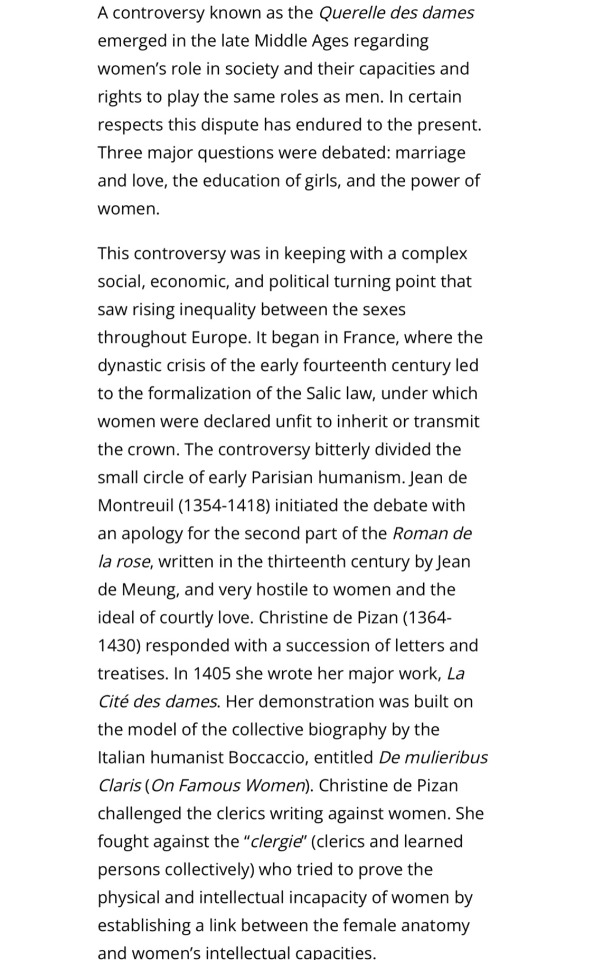
There is nothing new about “the woman question”. Ours is not the first enlightened century. Neither were the 20th century feminists. Neither were the 19th century Anglo feminists. To quote Dale Spender, “there has always been a women’s movement this century.” We see a “woman controversy” happening in the late Middle Ages of Europe.
There women defending themselves there, even though literacy was rare. There were also even men defending women - I’d like to get a hold of the male “women defenders” works, like Juan Rodriguez de la Cámara.
On the one hand, we’ve been facing the same damn question for centuries. On the other, we’ve made significant moves forward. Is there anything we can learn from these Medieval writers that can provide wisdom to our times today?
15 notes
·
View notes
Text
Introduction to “Magic Mommas, Trembling Sisters, Puritans and Perverts”
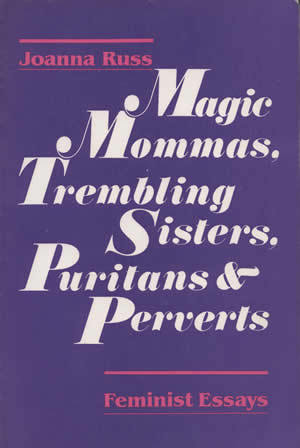
by Joanna Russ
From Magic Mommas, Trembling Sisters, Puritans and Perverts: Feminist Essays (The Crossing Press, 1985)
View as a PDF
Introduction
LIFE AND THEORY ARE BOTH NOTORIOUSLY SLIPPERY AND, SINCE the author doesn’t live her life according to feminist theory, but draws her feminist theory from her life (among other things), there’s much about the following essays I’d now like to change.
I have been haunted throughout the writing of these diverse pieces (especially the ones about pornography and the one entitled “Not for Years but for Decades”) by a feeling of not coming to grips with the rock-bottom of the subject. I think I now know why.
Contemporary feminist writing is fragmented and multifarious partly because there are so many questions and issues to be addressed and partly because our own feminist past has been in every case hidden from us, either through deliberate distortion, sheer re-invention, or total obliteration. Some earlier feminist movements like the suffrage movement in England were larger, more influential, and
more productive of radical theory than our own. Dale Spender’s wonderful, crucial new book, Women of Ideas and What Men Have Done to Them1 documents case after case of deliberate obliteration and reinvention–all women of achievement have received this treatment, not just feminists–and accumulates and articulates a comprehensive theory of feminism formed by the statement of its eighty-odd subjects (in her introductory chapters Spender says she had to stop her research arbitrarily when she began to run out of time and space, but that she never ran out of subjects).
Spender’s formulation of feminist theory isn’t final either, of course, but I’m going to propose as the primary demand of patriarchy what she chooses from Matilda Joslyn Gage 1873):2 that women’s resources be available, non-reciprocally and without pay, to men. If men have an unreasonable and unjust double amount of authority (intellectual and other), self-esteem, time, energy, leisure, cultural importance, wealth, freedom, and so on, this is precisely because they have stolen our time, our energy, our leisure, our authority, our labor and the wealth it produces, our self-esteem, our claims to knowledge and achievement, and our possibilities for autonomy and freedom. We are not merely excluded from male activities and institutions; our resources have been appropriated by men as their own in a massive theft lasting for centuries.
I think questions of sexuality and pornography which are of so much concern to feminists today can be clarified and demystified. If what matters is men’s non-reciprocal access to women’s resources, then male lust and even male violence are not the basic issues; they are merely particular examples of the fundamental issue (though one could argue, accurately I think, that it is exactly non-reciprocal access to women’s resources, i.e., male dominance, that results in male violence and male coercion).
I want to use “pornography” throughout not as a value judgment about particular material but merely to indicate commercial sexual fantasy sold largely to heterosexual men, of which some is violent and some is not and of which some is obviously contemptuous and hostile and some is not.
First, if and when pornography becomes a single-issue fight, that alone will be self-destructive. All single-issue fights are. The sheer length and frustration of the battle against any one manifestation of patriarchy will drive those women who focus on it alone to the point of accepting help from “allies” who subvert and undermine their activities, as Susan Anthony (according to Spender) became conservative in her later years and courted such “friends” as the racist and reactionary head of the W.C.T.U. Single-issue crusades inevitably “succeed” (like suffrage) at the cost of their radicalism, not because their proponents want this to happen but because public “success” demands the cutting off of any issue from its radical content and its wider radical context.
Second, I’d like to suggest that many of our current assumptions about pornography are not nearly radical enough. Some examples:
1. Pornography is bad because it’s violent and encourages violence against women.
2. Pornography is bad because it tells lies about women.
3. Pornography is bad because it’s caused by and encourages male lust, which (at least as constructed by the patriarchy) is violent and insatiable.
4. Pornography is bad because it presents women as degraded and humiliated.
I’d like to make here what I think is an important point: that the above statements lead to confusions in logic. For example, what about material that isn’t violent (it certainly exists)? What about the evidence that violent male youngsters and adults don’t read what we commonly see as violent pornography, but a small, specialized group of magazines like True Detective? (My authority for this is Rae Larson of SISTER–the Seattle Institute for Sex Therapy, Education, and Research.) What about the evidence that much of our mass literature, television, and movies encourages violence against women even more subtly and pervasively than pornography?
If pornography is bad because it tells lies about women, is it any worse–or even any different–from the rest of the culture? Patriarchal ideology and culture are nothing but lies about women. I think we often forget this simply because it’s so absolutely pervasive in everything from clothing to the design of houses to the structure of cities (anti-children and anti-women). And if pornography could be re-designed by main force so that it did tell some anatomical and emotional truths, would that make it acceptable? It would still represent the total availability of women’s resources (not only women’s bodies, but women’s energy and time) to men.
And that’s what’s wrong with it and would be wrong with it even if we could re-design it so that it avoided the obvious feminist objections of violence, contempt, and untruth. In this male-dominant culture, men who can’t or don’t want to buy women’s resources (including women’s bodies) via marriage or some kind of commitment, or rent women’s bodies, energies, and time via prostitution, can nonetheless buy fantasies of having access to women’s resources, i.e. pornography.
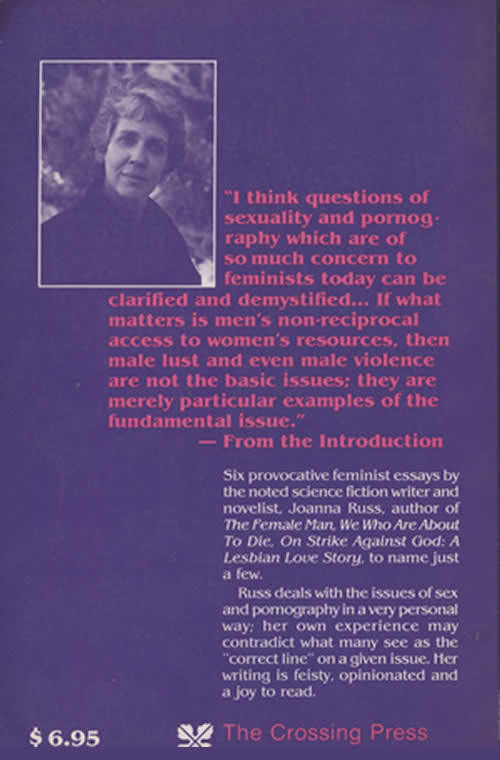
Moreover, I now believe that male sexuality per se has very little to do with any of these questions. The few talks friends of mine have had with men who were willing to drop macho pretensions, at least temporarily, Phyllis Chesler’s About Men5, as well as thirty-seven years of listening to male sexual bragging, have made me absolutely certain that men’s insistence on women’s “attractiveness” and sexual availability has nothing to do with either carnality or aesthetics. For one thing, “attractiveness” in women changes too fast and too often (this decade’s fashion is next decade’s hilarity) to have any deep connection with male instinct. Moreover, men make it clear that the way unadorned women actually smell, feel, and look (which surely arouses lust in conditions of actual copulation) is exactly what is not acceptable otherwise. What is demanded is that you “make something of yourself.” Sometimes this means being artificially thin or girdled and sometimes it means being artificially fat and padded, but it always means being unnatural and uncomfortable. What it also always means is giving off signals of the availability of your energies, time, emotions, and resources to men, that is, your loyalty to the patriarchal order.
In short, the demand for “attractiveness,” like the existence of pornography, is sexual harassment, nothing more and nothing less.
There is a confusion that bedevils all women, from the youngsters who think they can avoid sexism by finding “the right man” to the political theorists (like myself in the past) who assume that women’s oppression consists always of personal contacts with individually villainous men. Something like that seems to be haunting sexual issues now. It is simply not true, for example, that all women in the sex industry were forced into it and all are exploited. Similarly the image of all prostitutes as victims forced into the trade by violence or destitution (or kidnapped) will not withstand the evidence. If we object only to personal victimization and exploitation, or only to violence and humiliation, we won’t always find them-and what then? Do we withdraw our objections? I hope not! Looking for personal confrontations and extreme cases of violence or coercion leaves us without theory and therefore helpless in the face of male-dominated institutions, some of which look relatively benign and most of which are run not by open violence or coercion, but by “normal,” even “polite” ordinary behavior practiced by “nice,” “polite,” “tactful,” even “pleasant,” men.
There are many subtle ways of giving one’s time and energy to the patriarchy, and one (it seems to me) is to become over-occupied with male psychology, i.e. male violence, male sexuality, and the causes of male attitudes and male behavior. Even those of us who detest the patriarchy still find it difficult to become morally free of male power, of the massive and constant pull of men’s centrality, men’s importance, and the supposed “profound” causes of men’s behavior. (Men themselves are awfully fond of analyzing the deep psychology of their own, male misbehavior, especially to feminists!)
What about my earlier self, with her statement that “Sometimes I’m attracted to men I humanly like”? Was this real carnal arousal or was it merely a compound of guilt at not doing my job, the adoration of male normativeness and primacy and the uneasy, minimal arousal I finally under, stood and described in the first part of “Pornography and the Doubleness of Sex for Women”?
The “old dykes” who boast of their friendships with gay men, the women who cluster round pro-feminist men (real or otherwise) radiating gratitude and praise, the Lesbians who talk endlessly about their attraction to men and their “bisexuality,” when the psychology of genuinely bisexual women is quite different, all who allow fear to impress them morally or make them lie to themselves, who keep in their hearts not affection, not even concern, but adulation of the heroic, normative, central sex–all these are betraying themselves and other women.
To lose the connection to fundamental theory and to evaluate discrete bits of personal behavior as feminist or non-feminist (whether they’re male or female), is self-destructive and dreadfully confusing. Feminism isn’t a grab bag of all the good and nice things in the world (as some, albeit a very few, feminists sometimes seem to think) and patriarchy isn’t a collection of personally nasty behavior and all the bad things in the world. Nor is feminism a set of rules for virtuous living. To believe the former leads to helplessness in the face of institutionalized patriarchy and believing the latter leads to otherwise intelligent women boggling about absurdities, e.g. whether round Tarot cards are anti-authoritarian (I saw this statement seriously received, though I think -I hope -it was a gentle joke) or that vaginal stimulation is “male-identified” rather than being a matter of female desire and female anatomy.
We’ve been right to mistrust patriarchal theory (especially about ourselves) but feminist theory, just as broad and just as analytically sharp and accurate as we can get it, is a crucial necessity. It’s fatally easy in the heat of the moment to forget what feminist theory is-after all, the patriarchy gives us plenty of help on this point! Please don’t think I offer you the following essays as illustrations of accurate theory; most of them (except for “Power and Helplessness in the Women’s Movement”) now seem to me more warnings-go thou and do otherwise! –than examples.
But I may be too hard on my past self. You decide.
–November, 1984
ENDNOTES
Spender, Dale. Women of Ideas and what Men Have Done to Them (London/Boston: 1982), Routledge & Kegan Paul {Ark}. back
Gage, Matilda Joslyn. Women, Church, and State (Chicago: 1873), Charles Kerr. Reprinted by Persephone Press, 1980, Watertown, MA. back
Jennifer Macleod, The Village Voice, February 11, 1971. back
For example, it can be argued that commercial pornography for women exists. The feminist point of view would examine the cultural myths in such pornography (e.g. Rosemary Rogers’ novels) and find whether the same myth of male hegemony were being sold to both sexes. back
Chesler, Phyllis. About Men (N.Y.: 1978) Simon & Schuster. back
0 notes
Photo
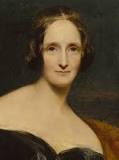
A alocação de espaço para os homens também foi seriamente questionada em relação às artes. "Por que não houve grandes artistas mulheres?", perguntou Linda Nochlin (1972).
Sua resposta estava longe da resposta oficial, que sustenta que as mulheres não são capazes de atingir o padrão de grande artista.
O artigo de Linda Nochlin foi direcionado aos criadores de padrões e levantou a questão incômoda e política de por que os homens persistiam em definir a arte feminina como inferior. Para que as mulheres pudessem julgar por si mesmas se eram as mulheres que não conseguiam ser excelentes artistas ou se eram os homens que se recusavam a admitir a excelência das mulheres, Rozsika Parker e Griselda Pollock, em seu livro Old Mistresses (1985), incluíram uma série de excelentes obras de arte femininas que os homens consideraram indignas de serem incluídas na história da arte e omitiram do registro de grandes artistas. (Como em muitas obras literárias, quando era extremamente difícil negar a excelência, o trabalho artístico de uma mulher era frequentemente atribuído a um homem. Essa prática - que foi comentada por Aphra Behn no século XVII - ainda persiste em muitos lugares). Até mesmo a questão do que constitui arte é relevante no contexto em que os homens determinam as definições: não é coincidência que eles percebam as atividades tradicionais dos homens como "arte" e as das mulheres como "artesanato".
Entretanto, uma série de definições femininas de arte está começando a surgir e livros como The Dinner Party: A Symbol of Our Heritage (1977), de Judy Chicago, ajudam a criar e definir os significados femininos, inclusive o significado da exclusão das mulheres da cultura masculina.
Mais uma vez, há evidências de que aqueles que estão no comando dos significados e padrões usam sua posição para garantir que continuem no comando dos significados e padrões. Para o feminismo contemporâneo, portanto, a pragmática dita que a questão não é tanto o motivo pelo qual os homens originalmente obtiveram o controle, mas sim como o domínio masculino pode ser encerrado.
Porque, apesar de todas as conquistas - as campanhas bem-sucedidas, as mudanças na lei, a proliferação de livros femininos -, enquanto os homens controlam os significados e os padrões, enquanto os homens continuam a definir tudo, desde a saúde até a arte, eles são capazes de decretar que o que os homens são e fazem, conta; e o que as mulheres são e fazem, não. Portanto, mesmo que as mulheres pudessem ter o escopo de conquistas iguais, no final, elas seriam menos valorizadas do que as conquistas masculinas.
For the Record, Dale Spender
#ficadica – pesquise sobre como a autora de Frankenstein, Mary Shelley, precisou publicar a primeira edição de seu livro com um pseudônimo masculino para que a obra tivesse o devido reconhecimento.
0 notes
Text
“Florence Nightingale was subjected to a ‘ladylike’ upbringing of enforced idleness with the most constructive activities allowed being those of company and visits, (Strachey says she was not even permitted to read to herself, but was read to, a practice which Nightingale describes as ‘like lying on one's back and having liquid poured down one's throat’ (ibid., p. 19).) It was against the uselessness and the despair of such an existence that Nightingale revolted and engaged in a continual battle with her parents. Her mother, who insisted on Nightingale's vacuousness in order that she might be marriageable, relented slightly as Nightingale grew older, rejected proposals, and passed the acceptable marriageable age. It was this relaxation of control, as well as Nightingale's determination, which led to her being able to break out from her suffocating existence and to pursue what she perceived as her vocation. But before she was able to make her move, she had to endure for more than thirty years the repressive regime of a leisured and unmarried woman, 'shut up tight within the conventions which forbade independent action to a woman' (ibid.). It was from this experience that she wrote about and analysed the position of women.
Florence Nightingale recognised that men insisted that women should be happy, and that women therefore were required to assert that they were happy — no matter what the circumstances of their lives — for men took it as a personal offence if the women whom they 'supported' declared themselves unhappy, with the result that women who wished to continue to be supported continued to state that they were happy even when they were most miserable. (This is a point taken up by Jessie Bernard in The Future of Marriage (1972), though, of course, she does not suggest that this is a fairly old idea and one put forward by Florence Nightingale.)
That it is obligatory for a woman to be happy, to present a contented and cheerful disposition to her master in order that he can feel satisfied with the arrangement and secure in the knowledge of his own psychological (as well as financial) indispensability, is a lesson that mothers unwaveringly teach their daughters, argues Nightingale. The only way such a lesson can be taught successfully is by the systematic denial and removal of passion from women. If emotion were allowed to reside in women, says Nightingale, women could not bear their lives, so women go round teaching ‘their daughters that "women have no passions." In the conventional society, which men have made for women, and women have accepted, they must have none, they must act the farce of hypocrisy, the lie that they are without passion — and therefore what else can they say to their daughters, without giving the lie to themselves?’ (Strachey, 1928, p. 396).
And the daughters, taught to deny the existence of any passion, to deny the existence of any will or force in themselves to cultivate a smiling, serene veneer, which reinforces men's images of themselves, try to find amusement, fulfilment, meaning, in the most 'escapist' activities. This is why women read novels, states Nightingale, for in a novel, the heroine has generally no family ties (almost invariably no mother), or, if she has, these do not interfere with her entire independence (ibid., p. 397); and the reader can dream. Women thus ‘wish their lives away’ because their daily existence denies them purpose, meaning, commitment, aspirations and action. They simply exist to cater for the psychological and physical needs of men and are permitted no life of their own. 'Passion, intellect, moral activity — these three have never been satisfied in a woman', says Nightingale. ‘To say more on this subiect would be to enter into the whole history of society, of the present state of civilisation' (ibid., p. 398), for women are given neither time, opportunity nor sanction to develop their own resources for themselves. (Mary Beard, 1946, had a great deal more to say on this subject.)
'Women are never supposed to have any occupation of sufficient importance not to be interrupted, except "suckling their fools", she continues, and women themselves have accepted this, have written books to support it, and have trained themselves so as to consider whatever they do as not of such value to the world or to others, but that they can throw it up at the first "claim of social life". They have accustomed themselves to consider intellectual occupation as a merely selfish amusement, which it is their "duty" to give up for every trifler more selfish than themselves (Strachey, 1928, p. 401).
So she continues, explaining why it is in a sense, women do not exist as individuals, why it is that women cannot pursue any intellectual activity, systematically, why it is that women's time is not considered valuable, and why it is that they do not have any. 'Women never have half an hour in all their lives (excepting before or after anyone is up in the house) that they can call their own, without fear of offending or of hurting someone' (ibid., p. 402), for they must always be available. And 'for a married woman in society, it is even worse. A married woman was heard to wish that she could break a limb that she might have a little time to herself. Many take advantage of the fear of “infection” to do the same' (ibid.).
Florence Nightingale gives every indication that she understands why the two sexes are required to behave in the manner that they do, and why it is that women's loss is men's gain. If it was this aspect of the woman question that she had in mind when she stated that she didn't expect much from the vote, her assessment was completely justified and her conventional portrayal as anti-feminist is then cast in a very different light. The changes that she sought (and which to some extent she managed to procure for herself — as did Harriet Martineau) were so radical that there was little likelihood that the vote would have been of much assistance in bringing them about.”
-Dale Spender, Women of Ideas and What Men Have Done to Them
#dale spender#florence nightingale#womens history#feminist history#reluctant motherhood#female oppression#male entitlement
310 notes
·
View notes
Text

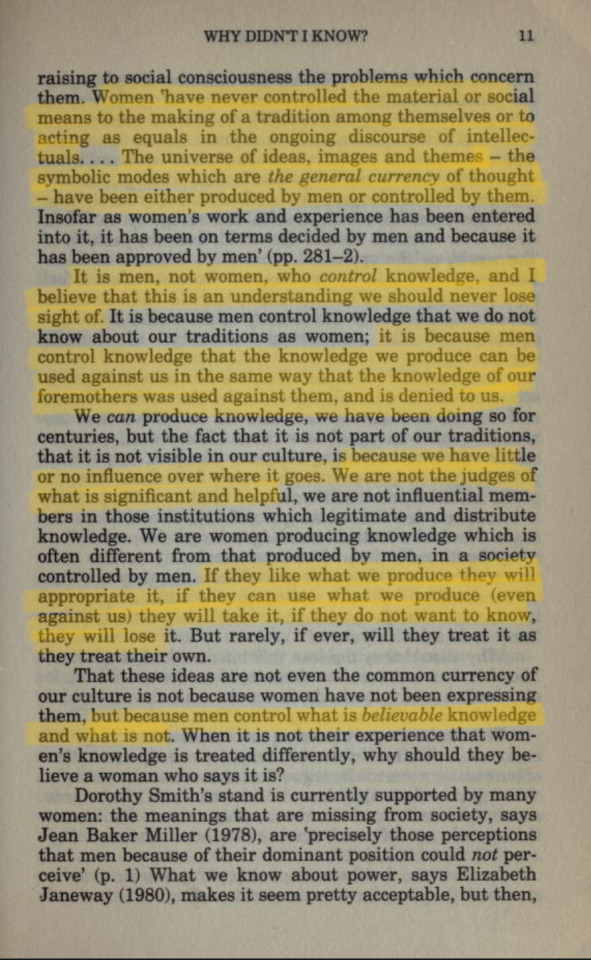


Dale Spender, Women of Ideas and What Men Have Done to Them, 1982.
34 notes
·
View notes
Text
“Feminism has fought no wars. It has killed no opponents. It has set up no concentration camps, starve no enemies, practice no cruelties. Its battles have been for education, for the vote, for better working conditions for women and children; for property rights for women, for divorce, for custody rights, for the right to safety on the streets. Feminist have fought for childcare, for social welfare, for grade of disability for people with disabilities.” -Dale Spender
14 notes
·
View notes
Quote
I have no reason to suspect that my own university education was peculiarly biased or limited. On the contrary, it appears to have been fairly representative. Yet in the guise of presenting me with an overview of the literary heritage of the English-speaking world, my education provided me with a grossly inaccurate and distorted view of the history of letters. For my introduction to the 'greats' was (with the exception of the famous five women novelists) an introduction to the great men. Even in the study of the novel where women were conceded to have a place, I was led to believe that all the initial formative writing had been the province of men. So along with other graduates of 'Eng. Lit.' departments I left university with the well-cultivated impression that men had created the novel and that there were no women novelists (or none of note) before Jane Austen.
Dale Spender, Mothers of the Novel: 100 Good Women Writers Before Jane Austen
#dale spender#english literature#as a literature major....this is still super true#and its not just women its minority literature#i mean i'm in a masters program and my uni stressed that the canon should be challenged#...and they still had us read shakespeare and fitzgerald#and they're great and important! but we've excluded women and minorities from being part of the canon#so if you're going to 'challenge' the canon let us read things that...actually challenge the canon#i took a women and the novel class in my undergrad and it was all post 1940 novels and no discussion of the history behind women and the nov#el#then i went to a christian private college (which was a mistake tbh except for that sweet sweet scholarship money)#and they definitely did not have us reading women#god all we read was like jane eyre and southern gothic short stories#jane eyre is not even representative....#i took a victorian lit class in undergrad and the only thing by a woman we read was jane eyre#then i took a victorian class last semester for my masters and all we read was dickens and hardy and shit#no females! ridiculous?#i could rant forever but i will cease now
4 notes
·
View notes
Photo

"It takes but a slight shift in focus… to see the numerous cases of violence against women not as pathological and idiosyncratic events, but as the normal pattern in a patriarchal society."
- Dale Spender, from For the Record: The Making and Meaning of Feminist Knowledge
#feminism#feminist#gender violence#violence against women#rape culture#patriarchy#patriarchal society#patriarchal culture#gender studies#feminist studies#feminist book#feminist books#dale spender
182 notes
·
View notes
Photo
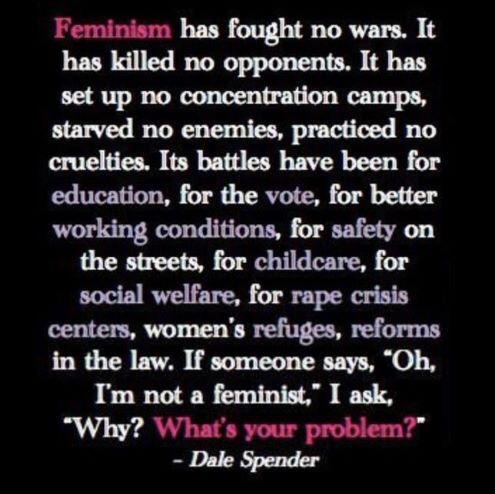
11 notes
·
View notes